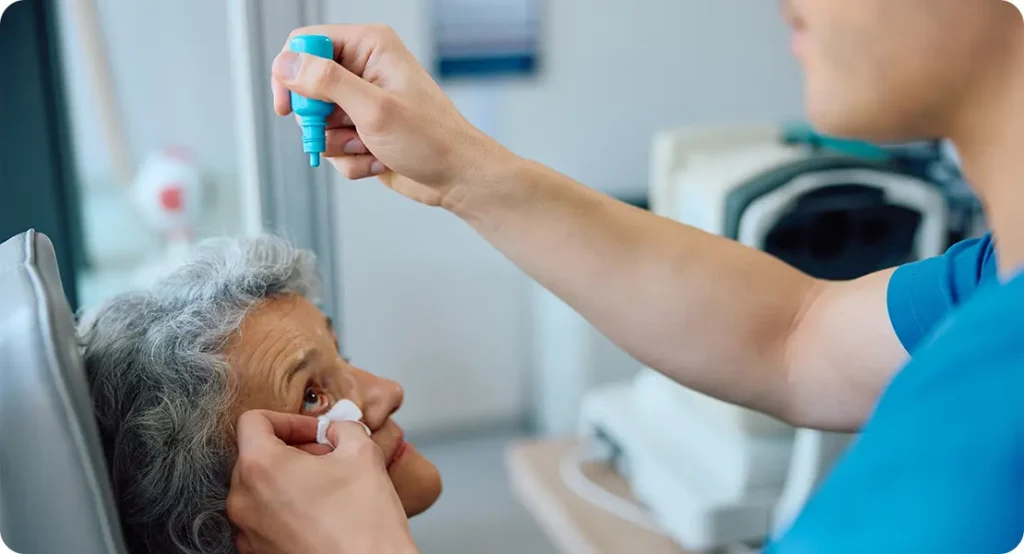If you’re dealing with both cataracts and severe eczema, it’s completely natural to wonder how these two conditions might interact. On the one hand, you’ve got a cloudy lens inside your eye that’s interfering with your vision. On the other, your skin — especially around your eyes — may be dry, cracked, and painfully reactive to products, weather, and even stress. When surgery is on the table, it’s not just your eyes you need to think about, but your whole skin health too.
This article will walk you through what to expect when undergoing cataract surgery with eczema. We’ll look at how dermatological sensitivities can influence surgical planning, how your eye surgeon will tailor the procedure and aftercare to suit your skin, and what you can do to reduce the chance of flare-ups before and after the operation.
Understanding Eczema and Its Ocular Effects
Eczema (or atopic dermatitis) isn’t just a skin condition. For many people, it’s a systemic inflammatory disorder that affects the skin’s barrier function and can make you more sensitive to allergens, irritants, and even temperature changes. If your eczema is around your face or eyes, it can complicate cataract surgery in several ways.
People with eczema are more prone to having dry eyes, blepharitis (eyelid inflammation), and allergic conjunctivitis. These issues can affect the tear film and the general health of the ocular surface. Before performing cataract surgery, your ophthalmologist will likely evaluate your tear production and look for signs of meibomian gland dysfunction or inflammation around the lids. These pre-existing issues don’t mean you can’t have surgery — but they do need to be brought under control first.
Another concern is the risk of infection or delayed healing. With eczema, the skin’s barrier is often compromised. If you have eczema on your face or eyelids, it’s easier for bacteria or allergens to get in, which could increase your risk of post-surgical complications. That’s why coordination between your ophthalmologist and dermatologist can be so important.
The Pre-Surgery Assessment: A More Careful Look
When preparing for cataract surgery, you’ll usually have a thorough pre-operative assessment. If you’ve got severe eczema, that assessment needs to be more detailed. Your skin’s condition, your current medications, and your eye surface health all play a bigger role in planning.
Your eye surgeon may ask you questions about what triggers your eczema — whether it’s pollen, dust, stress, or certain products. They’ll want to know what treatments you’re currently using, especially if you’re applying any corticosteroid creams around the eyes. If you’re on oral steroids or immunosuppressants like cyclosporine, those will be factored into your surgical planning too, as they may influence wound healing or your response to medications used during surgery.
This is also the stage where any active eye irritation or lid inflammation should be addressed. You may be referred to an ophthalmologist who specialises in ocular surface disease or to a dermatologist if your skin is flaring badly. Ideally, surgery should only be done when your eczema is under reasonably good control.
Choosing the Right Anaesthetic and Medications

One of the biggest considerations for people with eczema is sensitivity to certain chemicals. You may already know that preservatives in eye drops or certain adhesive tapes can trigger a reaction. In cataract surgery, many of the standard medications — from anaesthetic eye drops to dilating agents — contain preservatives like benzalkonium chloride, which can irritate sensitive skin and eyes.
If you’ve had allergic reactions to eye drops before, or if you know you’re sensitive to preservatives, let your surgical team know well in advance. They can often order preservative-free alternatives or use different preparation protocols. In some cases, a patch test may even be done to check for sensitivities to certain surgical adhesives or topical agents.
Anaesthesia during cataract surgery is typically local — most commonly in the form of eye drops or a numbing injection. If you have eczema near your eyes, your surgeon will take special care with draping to avoid irritating the skin. The adhesive used to hold your eyelids open may be replaced with gentler options or removed promptly after surgery to avoid post-operative irritation.
Surgical Considerations: Keeping Things Comfortable and Safe
While cataract surgery itself is very quick and straightforward in most cases, your eczema may mean a few extra precautions are taken during the operation. Your surgeon might use additional lubrication during the procedure to protect a dry or inflamed eye surface. They may also take extra care when removing the drapes and cleaning the area post-operatively to avoid triggering a skin reaction.
For patients who rub their eyes frequently because of eczema-related itchiness, there’s also a risk of inadvertently displacing the lens implant or disturbing the healing incision. This is something your ophthalmologist will talk to you about before surgery — and you may even be given an eye shield to wear while sleeping in the early days after the procedure.
Sometimes, a more gentle surgical approach is used — for example, avoiding longer-acting pupil dilators that might irritate the eye or delaying surgery if there’s an active flare. The key point is that cataract surgery is still very safe for people with eczema, but tailoring the process makes all the difference.
Post-Surgery Recovery: Monitoring Skin and Eye Health
After cataract surgery, you’ll usually be given antibiotic and anti-inflammatory eye drops to use several times a day for a few weeks. If you have eczema, these drops may cause stinging, dryness, or even allergic reactions, especially if they contain preservatives.
There are two main ways your team might handle this. First, they may choose preservative-free versions from the start, which are more expensive but often better tolerated in sensitive individuals. Second, they’ll keep a close eye on how your eyes and skin respond — and they might reduce the duration of your drops or switch brands if problems arise.
Another consideration is skin care around the eyes. If your eczema flares up during the healing period, you may be tempted to resume topical steroids. That’s okay in some cases — but only under supervision. Using steroid creams too close to the eye can increase pressure in the eye or risk infection, which you definitely don’t want during recovery. Your dermatologist may suggest using calcineurin inhibitors like tacrolimus instead, which are gentler on the eye area.
Finally, it’s essential to avoid rubbing or scratching your eyes while they heal. That can be tricky with eczema, especially if your skin feels dry or irritated. Cold compresses, lubricating eye drops, and antihistamines (if safe for you) can all help reduce that urge to rub.
Collaboration Between Dermatologists and Ophthalmologists

When both your skin and your eyes are involved, collaboration between specialists becomes a key part of successful treatment. A dermatologist can help ensure that your eczema is stable before the operation and suggest safer topical treatments during the recovery phase. Meanwhile, your ophthalmologist can adjust the surgical plan and medications to work better with your sensitivities.
If you’re being treated at a hospital or eye clinic, you can ask for a joint consultation or request that your notes be shared between your specialists. This ensures that everyone is working from the same understanding of your history, allergies, and medication usage.
Sometimes, patients with severe eczema are also under the care of an immunologist or rheumatologist — particularly if they’re on systemic immunosuppressants. That’s yet another reason why your care team should be in communication ahead of surgery.
Lifestyle and Environment: Reducing Flare-Up Risk After Surgery
The healing period after cataract surgery isn’t just about your eye drops. It’s also about keeping your body and environment as eczema-friendly as possible. That means:
- Avoiding known triggers: Try to limit exposure to allergens like pet dander, dust mites, or seasonal pollen — especially in the early healing phase.
- Hydrating your skin: Use emollients generously (but away from the eye area) to prevent dryness-related flare-ups.
- Watching the weather: Cold winds or dry indoor heating can make both your skin and eyes feel worse. Use a humidifier if needed, and try to stay in moderate climates during recovery.
- Managing stress: Surgery can be stressful — and stress is a known eczema trigger. Consider breathing exercises or light stretching to help keep your stress levels down.
Being aware of these factors gives you a much better chance of sailing through your recovery without any major skin or eye complications.
FAQ: Cataract Surgery and Severe Eczema
- Can eczema around the eyes delay my cataract surgery?
Yes, if you’re experiencing an active eczema flare-up around the eyes — with redness, swelling, or broken skin — your cataract surgery may be postponed. This isn’t to cause unnecessary delay, but to ensure your eye area is in the best condition to minimise the risk of infection, irritation, or healing complications. Surgeons prefer to operate when the skin barrier is intact and inflammation is well-controlled, so your recovery can go smoothly. If needed, your dermatologist may be brought in to help stabilise your skin before a new surgery date is set. - Are the eye drops after cataract surgery safe if I have eczema?
Post-surgery eye drops are generally safe, but people with eczema — especially those with facial involvement — may react to preservatives or active ingredients. Some drops contain benzalkonium chloride, which can irritate sensitive eyes or cause stinging, dryness, or allergic-type reactions. If you’ve reacted to eye drops before or have known sensitivities, your surgeon can prescribe preservative-free formulations. It’s also important to report any new redness, itching, or burning promptly after surgery, as these may signal a reaction rather than a standard healing response. - Can steroid creams for eczema affect my eyes after surgery?
Yes, topical steroid creams used near the eyes can influence eye health, especially during the delicate healing phase after cataract surgery. These creams can sometimes raise intraocular pressure, delay healing, or increase the risk of infections if used too close to the eye without supervision. If your eczema flares during recovery, speak to your dermatologist — they may recommend alternatives such as tacrolimus or pimecrolimus, which are non-steroidal and generally safer to use on the eyelids. Avoid self-medicating and always involve your surgical team before resuming any periocular treatments. - What if I’m on immunosuppressants for eczema — is surgery still safe?
Cataract surgery can still be performed safely if you’re taking immunosuppressants like cyclosporine, methotrexate, or dupilumab, but the surgical team will take extra care when planning your procedure. These medications can slightly increase the risk of infection or slow down wound healing, so your doctors may adjust the timing of surgery or monitor you more closely during recovery. It’s important that your dermatologist and ophthalmologist communicate to coordinate your care effectively. In many cases, no change to your medication is needed, but individual assessment is crucial. - Will eczema make recovery from cataract surgery more uncomfortable?
It can in some cases, especially if your eczema affects the eyelids or you already have dry, sensitive eyes. Post-operative drops, draping adhesives, or even minor environmental changes can trigger itchiness or irritation in susceptible patients. That said, your team will aim to prevent this by using gentler products, avoiding triggers, and offering preservative-free medication when necessary. With good planning, many people with eczema recover just as comfortably as those without, but you should report any discomfort early to prevent escalation. - Can the surgery make my eczema worse?
While cataract surgery itself doesn’t cause eczema to worsen, some aspects of the process — such as physical stress, anxiety, certain medications, or adhesives used on the face — might contribute to a flare-up. Additionally, a disrupted sleep schedule or immune response after surgery could mildly impact your skin. However, if you prepare ahead, keep your eczema well-managed, and avoid known triggers, the likelihood of a major post-operative flare is low. Many patients with eczema go through cataract surgery without any worsening of their skin condition. - Should I stop my eczema treatments before surgery?
You should never stop your eczema medications without first checking with your doctors. Some treatments — particularly topical steroids, biologics, or systemic immunosuppressants — may need to be paused or adjusted temporarily, but that decision depends entirely on your individual situation. In most cases, continuing your skin treatments ensures your eczema remains stable, which actually improves surgical outcomes. Always let your surgical team know what medications you’re using, including over-the-counter creams or herbal products, so they can make the best recommendation. - Are there special precautions taken during surgery if I have facial eczema?
Yes, your surgical team will make specific adjustments to protect your skin and eyes. If you have eczema around your eyelids or cheeks, they may avoid standard adhesive tapes or use gentler hypoallergenic alternatives. Extra care is taken when cleaning the skin and removing drapes to avoid further irritation. In some cases, lubricating gel is used more generously during surgery to protect a dry or inflamed eye surface. These precautions are part of a tailored approach to ensure your skin and eyes are both respected during the procedure. - How soon can I return to using my regular skin products after surgery?
It’s best to wait at least a week or two before resuming any skincare products around the eyes, and even then, you should only use products that are non-irritating and approved by your care team. The early healing phase is a sensitive period, and introducing emollients or creams too close to the surgical site could disrupt healing or increase infection risk. Your dermatologist or surgeon may suggest a specific cream to use if your skin is especially dry during this period. Always avoid rubbing or applying pressure near the eye while healing. - Is cataract surgery worth doing if I have bad eczema?
Absolutely. Severe eczema is not a barrier to successful cataract surgery — it simply means the approach needs to be a little more individualised. With clear communication, appropriate skin and eye preparation, and careful post-operative care, most people with eczema experience excellent visual outcomes and manageable recovery. In fact, many patients report that the overall improvement in vision significantly outweighs the temporary challenges posed by their skin condition. Choosing a surgeon who understands complex dermatological considerations makes all the difference.
Final Thoughts
Cataract surgery is highly successful, even if you’re living with severe eczema. The key is personalisation — adapting the approach to suit your unique skin sensitivities, medication history, and ocular surface health. With the right planning and communication between your dermatologist and ophthalmologist, you can still expect a smooth procedure, improved vision, and a comfortable recovery.
If you’re looking for more tailored advice, or you want a surgeon who regularly works with patients who have complex skin or eye conditions, London Cataract Centre offers expert support and custom care for every case.
References
- Shim, S. et al., 2024. A Risk-Scoring System to Predict Dupilumab-Associated Ocular Surface Disease in Patients with Atopic Dermatitis. Frontiers in Pharmacology, 15:1425550.
Available at: https://www.frontiersin.org/articles/10.3389/fphar.2024.1425550/full [Accessed 30 Jul 2025]. - Oh, W.Y. et al., 2021. Characteristics of Retinal Detachment Associated with Atopic Dermatitis. BMC Ophthalmology, 21, Article 276.
Available at: https://bmcophthalmol.biomedcentral.com/articles/10.1186/s12886-021-02135-7 [Accessed 30 Jul 2025]. - Yoon, J. et al., 2023. Practical Management of Ocular Surface Disease in Patients with Atopic Dermatitis: Interdisciplinary Dermatology and Ophthalmology Review. Journal of the American Academy of Dermatology.
Available at: https://www.sciencedirect.com/science/article/pii/S0190962223001962 [Accessed 30 Jul 2025]. - Asbell, P.A. et al., 2023. Conjunctivitis in Adults with Atopic Dermatitis Treated with Dupilumab: Observational Study. Advances in Therapy, 40(8), pp. 3501–3514.
Available at: https://pubmed.ncbi.nlm.nih.gov/37404010 [Accessed 30 Jul 2025].

